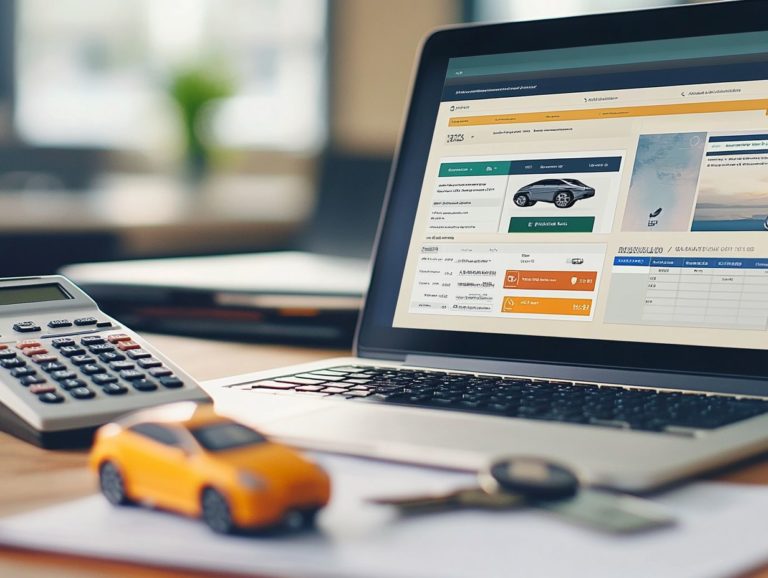The Benefits of Paying Cash for a Car
Buying a car is an exciting milestone! The way you pay can transform your financial experience and ownership journey.
Paying cash offers significant advantages: you avoid interest payments and achieve full ownership right away.
This guide explores the financial and ownership benefits of paying cash, shares effective saving tips, and examines alternatives like financing and leasing.
Whether you re ready to purchase or planning ahead, this information will empower you to make informed and strategic decisions.
Contents
Key Takeaways:

Paying cash for a car can save you money by avoiding interest rates.
Enjoy peace of mind with full ownership and no monthly payments.
To succeed, save wisely and set a realistic budget!
Explanation of the Concept
Understanding the dynamics of buying a car involves multiple aspects, such as whether to pay cash or explore financing.
Each payment method has pros and cons that can influence your financial health and cash flow. It s vital to research the used vehicle market and obtain a vehicle history report to make an informed investment decision.
When considering vehicle financing, grasping key concepts like interest rates extra money paid when borrowing and loan terms is essential. This knowledge will dictate your total expenditure over time.
Financing can open doors to a car that might be out of reach if you pay cash, but it also means committing to long-term debt.
On the other hand, buying outright with cash eliminates monthly payments, promoting better financial stability and saving you from interest costs.
Be aware of hidden expenses, such as maintenance, insurance, and taxes. Preparing for effective dealership negotiations can lead to significant savings.
Careful financial planning ensures you choose a vehicle comfortably within your budget, paving the way for future opportunities and helping you avoid potential financial strain.
Advantages of Paying Cash for a Car
Paying cash for a car presents a range of advantages that can significantly improve your financial landscape and simplify the buying process.
With a cash payment, you can negotiate price reductions effectively and get rid of the stress that often comes with debt.
This approach not only leads to substantial savings but also provides invaluable peace of mind.
Cash discounts can help you secure a better deal while freeing you from monthly payments and interest rates tied to vehicle financing.
However, it’s essential to consider these benefits alongside the potential drawbacks of cash payments, particularly their impact on your emergency funds and overall financial stability.
Financial Benefits
One compelling financial benefit of paying cash for a car is the elimination of loan payments and interest rates, significantly lowering your overall vehicle ownership costs.
By choosing to pay in cash, you enhance your cash flow and avoid the stress that often comes with monthly financing obligations.
Full ownership from day one allows you to allocate your resources more strategically, freeing up funds for other areas of your life.
Without the burden of financing, you can simplify your budgeting and create a more predictable financial landscape, making it easier to track expenses and identify potential savings over time.
Studies indicate that those who pay cash for a vehicle can save anywhere from 10% to 20% in total ownership costs by avoiding interest payments on loans.
This approach not only cultivates financial discipline but also opens the door to greater savings, which you can redirect toward future investments or an emergency fund.
Plus, steering clear of financing-related debt contributes to an improved credit score, positioning you for better financial opportunities down the line, such as securing future loans at more favorable rates.
Ready to hit the road? Start saving for your cash payment today!
Ownership Benefits

The benefits of paying cash for a car go well beyond just the financial implications. It offers you more freedom and control over your vehicle decisions.
When you pay in cash, you can negotiate the price more effectively with dealerships. This potentially unlocks cash discounts that result in significant savings on both new and used vehicles.
Full ownership means you can make informed choices regarding car features, maintenance, and insurance without the constraints of financing terms. This financial independence alleviates the stress of monthly payments and elevates your overall satisfaction with your vehicle choice.
You’re enabled to prioritize your preferences, making decisions based on what you truly need rather than being tied down by lender constraints. A vehicle valuation tool helps you understand the market. This way, you know the true value of used cars.
By acquiring knowledge about used car prices, you strengthen your negotiating position. This allows you to make choices that align better with your finances and lifestyle. This transforms car ownership into a truly rewarding experience.
Start Saving Now for Your Dream Car!
Saving for a cash car purchase demands a blend of strategic planning and disciplined budgeting to accumulate the necessary funds over time.
By implementing effective money-saving tips and gaining a clear understanding of your financial landscape, you can enable yourself to reach this goal with greater efficiency.
Establishing a realistic budget that factors in the cost of your vehicle, potential cash reserves, and essential emergency funds is crucial. An emergency fund is a separate savings account for unexpected expenses.
A financial planner can provide valuable insights, helping you optimize your savings strategy and keep you firmly on track to acquire your desired vehicle.
Tips for Saving Money
Implementing effective strategies for saving money can significantly simplify the journey toward accumulating funds for your car purchase while enhancing your overall cash flow.
By focusing on building emergency funds and maintaining a dedicated savings account, you create a reliable safety net as you pursue your goal.
Small lifestyle adjustments, like crafting a budget and prioritizing your expenses, can further accelerate your savings efforts. Automating transfers to your savings account allows you to ensure that a portion of each paycheck goes directly toward your financial objectives, minimizing the temptation to spend.
Assessing your discretionary spending think dining out or subscription services can free up extra cash that you can redirect toward savings. Exploring side jobs or freelance opportunities can also boost your income while fostering a culture of financial discipline.
Maintaining a robust cash flow not only aids you in reaching specific savings targets but also strengthens your financial stability against unforeseen expenses.
Setting a Realistic Budget
Setting a realistic budget is imperative as you prepare for that cash car purchase, ensuring you account for all associated vehicle costs and monthly expenses.
A well-structured budget, perhaps crafted with the guidance of a financial planner, can help you manage your cash flow effectively, clearly delineating how much you can set aside each month. This method enables you to balance your financial commitments while steadily progressing toward your goal.
When devising a comprehensive budget, consider not just the initial purchase price, but also the ongoing expenses that come with car ownership. This encompasses:
- Insurance premiums
- Regular maintenance to keep your vehicle in top condition
- Unexpected repairs that inevitably arise
Don t underestimate variable costs such as fuel, parking fees, and tolls they can accumulate quickly. By factoring in the total cost of ownership, you ll gain a clearer understanding of your financial responsibilities.
Establishing a monthly savings target that aligns with both your short-term and long-term financial goals will ensure that your budget remains realistic and sustainable as you move forward.
Take control of your finances today and drive home your dream car soon!
Alternatives to Paying Cash for a Car

While paying cash presents numerous advantages, exploring alternatives can offer you flexibility and additional financing options tailored to your financial circumstances.
Vehicle financing enables you to spread the cost of a car over time through manageable loan payments. This can be quite beneficial when approached with care.
However, it s crucial to consider factors like interest rates and dealership negotiations. This will help you make informed choices about whether to finance or lease your next vehicle.
Financing Options
Exploring various financing options allows you to make informed decisions when purchasing a car, especially if cash isn’t your preferred route.
Understanding the details of vehicle financing like loan payments and interest rates is vital for maintaining a healthy cash flow while juggling your long-term financial commitments.
Mastering effective dealership negotiations can significantly enhance your financing experience. This might lead to tailored terms and conditions that suit your unique needs.
When considering bank loans, you often find competitive interest rates. However, be mindful of the stricter qualification criteria that may apply.
Credit unions typically offer a more personalized approach and lower rates, although membership can sometimes pose a barrier.
Dealership financing is convenient and quick. However, make sure to carefully check the terms, as they might not always favor you.
By arming yourself with the right knowledge about these diverse options including the importance of understanding your credit score you can confidently negotiate better deals and secure financing that aligns with your financial profile.
Leasing vs. Buying
When contemplating how to finance your car purchase, grasping the differences between leasing and buying is essential for making a choice that aligns with your financial aspirations.
Leasing typically means lower monthly payments and the pleasure of driving a new vehicle every few years. In contrast, buying grants you full ownership and the liberty to customize your car to your heart’s content.
Taking a close look at your cash flow and long-term financial plans can guide you in deciding which option best fits your lifestyle.
Your decision will depend on several factors, including your expected annual mileage and maintenance costs.
If you lean towards the allure of a brand-new model without the headaches of upkeep, leasing might catch your eye. On the other hand, buying a car can lead to significant long-term savings once it’s paid off, you’re free from monthly obligations, making it an appealing choice for anyone who values ownership.
It s wise to reflect on your personal financial situation. You might find yourself drawn to leasing for its flexibility or choose buying to enjoy the security of outright ownership. Understanding these nuances can help you make a more tailored decision.
Final Thoughts and Recommendations
Navigating the car-buying process demands careful consideration of your financial landscape and the myriad options available, including vehicle financing and cash payment methods.
Engaging a financial planner can offer invaluable insights into managing your cash flow. This ensures that your car purchase aligns seamlessly with your long-term financial aspirations.
Researching the reputations of car dealerships will enable you to make informed decisions while securing the most advantageous deals on your next vehicle.
By diligently evaluating all potential expenses and financing alternatives, you can sidestep unnecessary financial strain.
A solid understanding of interest rates, loan terms, and potential hidden fees will equip you to negotiate with confidence.
Establishing a clear budget helps you maintain control over your expenditures and provides the flexibility to seize unexpected opportunities as they arise.
Ultimately, a smart strategy can make your car-buying experience exciting and rewarding!
Preguntas Frecuentes

Cu les son los beneficios de pagar en efectivo por un autom vil?
Pagar en efectivo te convierte en el due o del autom vil. No tendr s que preocuparte por pagos mensuales ni intereses, lo que puede ahorrarte mucho dinero a largo plazo.
Es mejor pagar en efectivo o financiar un autom vil?
La elecci n depende de tu situaci n financiera. Pagar en efectivo significa que no tendr s deudas, mientras que financiar te permite dividir el costo a lo largo del tiempo.
C mo afecta esto a mi puntaje de cr dito?
Pagar en efectivo no impacta directamente tu puntaje de cr dito, ya que no hay un pr stamo. Sin embargo, si planeabas financiar para construir cr dito, esto puede tener un efecto indirecto.
Hay beneficios fiscales al pagar en efectivo?
Podr an existir beneficios fiscales dependiendo de tu estado y del costo del autom vil. En algunos lugares, pagar en efectivo solo requiere impuestos sobre el monto inicial, mientras que financiar puede implicar impuestos sobre el total.
Cu l es la mejor forma de ahorrar para un autom vil?
Crea un presupuesto y destina una cantidad espec fica cada mes para tus ahorros de autom vil. Tambi n considera reducir gastos o aumentar tus ingresos para ahorrar m s r pido.
Existen desventajas al pagar en efectivo?
Una desventaja puede ser que te quedes con menos efectivo para emergencias. Adem s, podr as tener que elegir un autom vil m s asequible o usado si no tienes suficiente dinero para uno nuevo.






